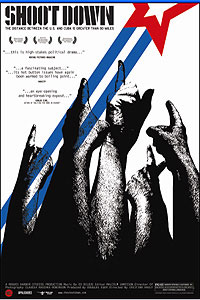Shoot Down (PG-13)

synopsis
In the mid-to-late '90s, thousands of Cuban refugees attempted to cross the Florida Straits by whatever means available--small boats, homemade rafts and inner tubes. Only one in four rafters made it to U.S. shores, with tens of thousands perishing at sea. A volunteer group based in Miami called "Brothers to the Rescue" was formed to patrol the Straits in small civilian aircraft, offering aid to rafters. On Feb. 24, 1996, in the midst of heightening political unrest in Cuba and in the wake of a revised U.S. policy toward Cuban refugees, the Cuban government authorized two military fighter jets to attack and destroy two of the volunteer planes. Cristina Khuly, a first-generation Cuban-American whose uncle was among the four victims, mined 10 years of research, government documents, transcripts and never-before seen news footage of Fidel Castro to supplement hundreds of hours of original interviews in recounting the events leading up to and following the shoot down. Among the film's most extraordinary moments are the use of actual voice recordings from the MiG pilots and their controllers in Havana, and the cockpit recordings from the doomed Cessna planes, edited to re-enact the shoot down itself. The result is an unprecedented and compelling re-telling of a tragedy that is as relevant and provocative today as it was more than a decade ago.
details
Documentary
1 hr. 25 min.
Opened January 25th, 2008

synopsis
In the mid-to-late '90s, thousands of Cuban refugees attempted to cross the Florida Straits by whatever means available--small boats, homemade rafts and inner tubes. Only one in four rafters made it to U.S. shores, with tens of thousands perishing at sea. A volunteer group based in Miami called "Brothers to the Rescue" was formed to patrol the Straits in small civilian aircraft, offering aid to rafters. On Feb. 24, 1996, in the midst of heightening political unrest in Cuba and in the wake of a revised U.S. policy toward Cuban refugees, the Cuban government authorized two military fighter jets to attack and destroy two of the volunteer planes. Cristina Khuly, a first-generation Cuban-American whose uncle was among the four victims, mined 10 years of research, government documents, transcripts and never-before seen news footage of Fidel Castro to supplement hundreds of hours of original interviews in recounting the events leading up to and following the shoot down. Among the film's most extraordinary moments are the use of actual voice recordings from the MiG pilots and their controllers in Havana, and the cockpit recordings from the doomed Cessna planes, edited to re-enact the shoot down itself. The result is an unprecedented and compelling re-telling of a tragedy that is as relevant and provocative today as it was more than a decade ago.
details
Documentary
1 hr. 25 min.
Opened January 25th, 2008







